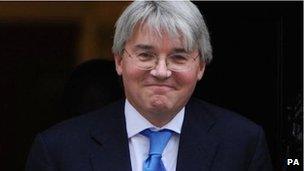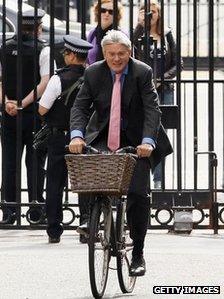Profile: Andrew Mitchell
- Published

Andrew Mitchell is a former investment banker
Long-standing Conservative MP Andrew Mitchell has only recently been put in charge of keeping the Tory backbenches in order as David Cameron's new chief whip.
He was moved from his role in international development earlier this month.
But he is no newbie to politics, having first been elected as an MP in the eighties and growing up in a political household - his MP father Sir David Mitchell served as a minister under Margaret Thatcher.
Mr Mitchell, 56, was educated at Rugby public school. It is here the self confessed "stern disciplinarian" is said to have earned the nickname "Thrasher".
He read history at Jesus College, Cambridge where his extra curricular activities included chairing the student Conservatives and becoming President of the Cambridge Union.
Maastricht rebellion
Before going to university, Mr Mitchell served in the Royal Tank Regiment and as a UN peacekeeper in Cyprus.
But upon graduating he moved into the world of banking, taking up a role with investment bank Lazard Brothers.
During this time he got married to Sharon, a doctor. They have two daughters.
He was determined to get into politics and, having failed to get elected in 1983 in Sunderland South, he won the seat of Gedling in Nottinghamshire in 1987.
Here he started his career in the whip's office, serving as a government whip during the notorious rebellion over the Maastricht Treaty - where a number of Conservative MPs voted against Prime Minister John Major.
He was made a vice-chair of the Conservative Party and later promoted to be social security minister, and he was tipped as a future chief whip in the mid-1990s.
But his career suffered a set back when he lost his seat in the Labour landslide of 1997.
This brought to an end a decade of serving in the House of Commons alongside his father - who retired the same year.
He returned to Lazard Brothers as a director and began his search for a new, and hopefully safer, seat.
After five other attempts, he beat a large field to succeed Sir Norman Fowler in Sutton Coldfield, where he has built up a large majority since 2001.
Back inside the Commons, he got involved with the party's leadership machinations as it tried to find someone to take on Tony Blair.
As early as October 2002 he was named by the Daily Telegraph as one of four ringleaders in a plot to oust then leader Iain Duncan Smith.
Police row
He found favour with Mr Duncan Smith's replacement, Michael Howard, who promoted him into the shadow cabinet as shadow international development secretary after the 2005 general election.
He ran David Davis' failed leadership campaign in 2005, but kept his shadow cabinet job under David Cameron's regime. He is now seen as a Cameron loyalist.

Mr Mitchell had a row with police when cycling out of Downing Street
Mr Mitchell stayed in the shadow international development role all the way through to the 2010 general election, after which he took the post on in government.
He oversaw moves to make aid more transparent and repeatedly pledged to enshrine in law an obligation for the UK to spend 0.7% of its national income on overseas aid - something which has angered some of his Conservative colleagues.
When David Cameron carried out his first major reshuffle in early September, he made Mr Mitchell his new chief whip.
It was a couple of weeks after taking up this job that, after what he called a "long and extremely frustrating day", he allegedly swore at a police officer who stopped him cycling out of the main Downing Street gates.
He initially issued a written apology for the outburst, which was also reported to have seen him calling the officer a "pleb", with Mr Mitchell apologising on camera for the first time five days after the incident.
In his public apology he said he was sorry he had not shown the police enough respect, but denied saying the words attributed to him in The Sun newspaper.
But his statement failed to end the row about the incident, with Labour and the Police Federation both calling for a full inquiry into what Mr Mitchell said, while a series of senior Lib Dems said he had left questions unanswered.
His friend of 25 years, MP Michael Brown - who worked with Mr Mitchell in the whips office in the early nineties - said the incident was "totally and utterly out of character".
He said: "A 30 second moment of madness by the chief whip, who I know to be a very decent and honourable man.
"I come from the wrong side of the tracks. I'm a secondary modern school boy, an eleven plus failure and I can tell you working with Andrew Mitchell was an absolute delight and a privilege."